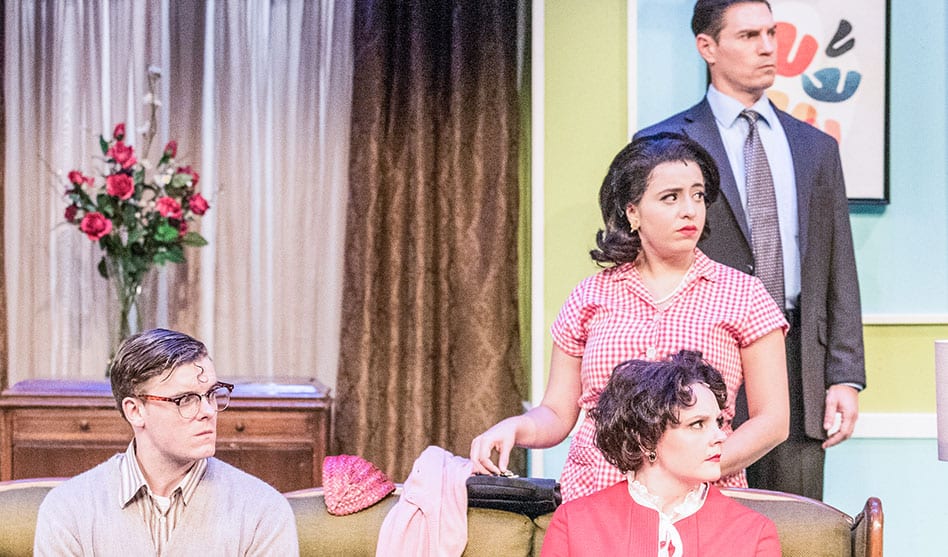Closeted gays try to fool the government with ‘lavender marriages’ in ‘Perfect Arrangement.’
(Photo courtesy Mike Morgan)
‘Perfect Arrangement’ is anything but; Second Thought stages a ‘Revolt’
ARNOLD WAYNE JONES | Executive Editor
jones@dallasvoice.com
 The 1950s were, I suppose, the America that Trump was thinking of as the greatness we needed to make it again. Well, great is a matter of perspective. It marked the rise of the affluent middle class, sure… for straight, patriotic, white Christian men. For women, who couldn’t get a mortgage without a man cosigning, not so much. Ditto for Jews excluded from neighborhoods, blacks saddled with the remnants of Jim Crow, political-left-leaners toying with socialism and queer people.
The 1950s were, I suppose, the America that Trump was thinking of as the greatness we needed to make it again. Well, great is a matter of perspective. It marked the rise of the affluent middle class, sure… for straight, patriotic, white Christian men. For women, who couldn’t get a mortgage without a man cosigning, not so much. Ditto for Jews excluded from neighborhoods, blacks saddled with the remnants of Jim Crow, political-left-leaners toying with socialism and queer people.
Bob Martindale (Kevin Moore) manages four out of five, but from his perch in the personnel office of the State Department, has remained safe. Bob and his secretary Norma (Olivia Grace Murphy) are both secretly gay, but have the ideal cover: They share both sides of a duplex, with Bob “married” to Norma’s girlfriend Millie (Alyssa Cavazos) and Norma “wed” to Bob’s lover Jim (Matt Holmes); they surreptitiously swap bedrooms every night through a hidden door concealed, appropriately enough, in a closet. When Bob and Norma are tasked with not just rooting out commies but also deviants — including homosexuals — it seems like a happy coincidence: They are both the hunted and their own hunters, immune from J. Edgar’s disapproving meddling.
If you can’t tell from that description whether Perfect Arrangement, onstage for just one more weekend from Uptown Players, is a comedy or a drama, welcome to the club. The tone is infuriatingly inconsistent, or at least does not serve the various beats of the plot. It starts off as a straightforward one-set comedy, hints that it will progress into full-on sex farce before turning mawkish, melodramatic and kinda smarmy. The last moment flirts with tragedy, although it’s played with such broad strokes that any pathos evaporates immediately.
It could be all those things, if the play were more deft. Douglas Carter Beane’s The Nance — which Uptown produced several seasons ago — did just that: A wacky farce about a gay vaudevillian who lives in his protected cocoon… until he doesn’t anymore. Topher Payne, who wrote Perfect Arrangement, is not so clever. It’s fine to make a comedy about McCarthyism, but you’d better know how to do it, and he doesn’t.
Director B.J. Cleveland emphasized the artifice; in the opening scene, all the characters speak in the exaggerated voices of people disguising their true selves behind masks of superficiality. The problem is, he never lets them reset to anything approaching humanity. It’s the kind of acting you’d see in a movie made in the 1930s… or maybe a Carol Burnett sketch spoofing a movie made in the 1930s. If you never relate to the characters as real people, you’d better keep the jokes coming like a fusillade, or insert a catchy song-and-dance. That never happens.
The play is trying to say something historically true with a witty touch of perspective. Gay people were the victims of an actual witch hunt, not the kind our president derides as code for “they are getting too close.” I have no doubt that when Payne was writing it, he had Edmund Burke’s most famous quote — “All that is necessary for the triumph of evil is for good men to do nothing” — on a little poster over his keyboard. But the situations he sets up are overblown and strained, and there’s very little comic potential in them… or if there is, the cast doesn’t make much out of it. Add to that ugly costumes and a sitcomy sensibility, and you’ve got something far less perfect than its title implies.

A woman (Jenny Ledel) challenges her husband (Max Hartman) about the language of sex in ‘Revolt.’ (Photo courtesy Karen Almond)
 The title of Revolt. She Said. Revolt Again., is clearly the worst thing about Second Thought’s season-closing production. Like Perfect Arrangement, it’s something of a hodgepodge of styles — angry political diatribe, scathing social satire, abstract performance art. The difference is, playwright Alice Birch doesn’t try to mesh them really — they are divided into acts (although the show is performed in 75 minutes without intermission) that set you up for what’s to come.
The title of Revolt. She Said. Revolt Again., is clearly the worst thing about Second Thought’s season-closing production. Like Perfect Arrangement, it’s something of a hodgepodge of styles — angry political diatribe, scathing social satire, abstract performance art. The difference is, playwright Alice Birch doesn’t try to mesh them really — they are divided into acts (although the show is performed in 75 minutes without intermission) that set you up for what’s to come.
It’s a clever construction, and mostly successful. Five actors — four women (Jenny Ledel, Lydia Mackay, Tia Laulusa and Christina Vela, who also directed) and one man (Max Hartman) — take on a host of characters, performing mostly brief sketches around issues of womanhood: career, relationships, parenting. But the tone, reinforced by projections that separate the scenes, is revolutionary. How do we use language to promote stereotypes? How can we appreciate a woman’s body and sexuality without objectifying her? Does being a strong woman in business make you powerful or a bitch? It’s funnier (much of the time) than it sounds, though there are intense scenes peppered in. There’s an element of confrontation in the intimate setting that really draws in the audience. It’s meant to be provocative.
Not everything works; a “curtain speech,” delivered as if being threatened by a commandant of a reeducation camp, seems to establish angry-feminist bona fides, but Birch is sly about how she conveys her politics. Sometimes the women are being as ridiculous as the men … or are they? Is a proposal of marriage an expression of love, or domination? It challenges you. Revolt is not subtle, but it is layered, and well-acted by the cast. And considering that the play was first performed in 2014, long before #MeToo and #TimesUp, it’s also disturbingly prophetic.












